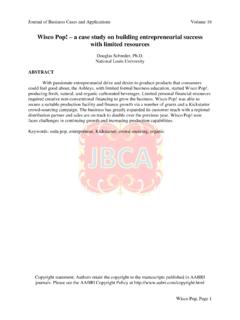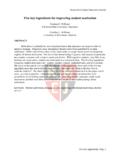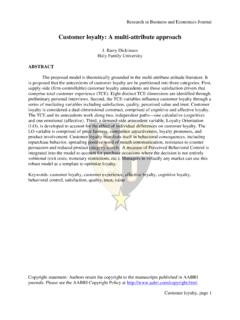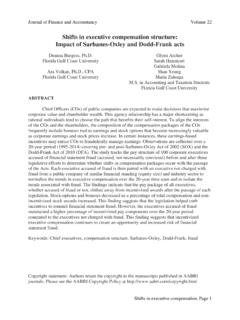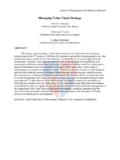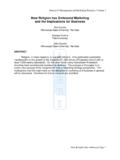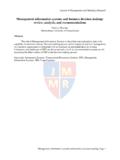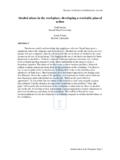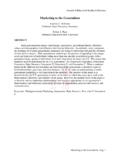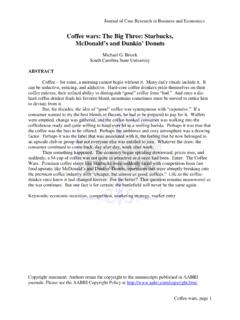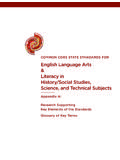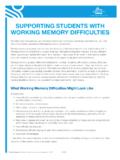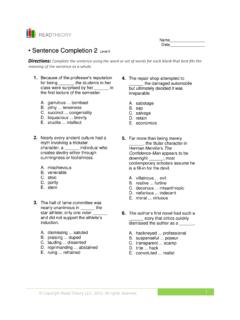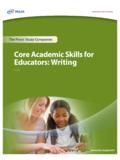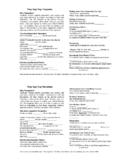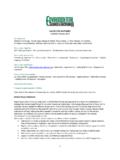Transcription of Supporting the development of students’ academic writing ...
1 Journal of Instructional Pedagogies Supporting the development , page 1 Supporting the development of students academic writing through collaborative process writing Faustin Mutwarasibo National University of Rwanda & Link ping University ABSTRACT The study examines how undergraduate university students in Rwanda experience collaborative process writing as an instruction method capable of helping them improve their academic writing abilities in English. It involved 34 second-year students, divided into 12 small working groups. The data were collected by means of group interviews carried out in English after all groups finished writing an argumentative essay using the collaborative process writing method. In their responses, students maintained that they still experienced some writing difficulties in English in connection with planning, organization, cohesion and coherence and grammar. However, by combining collaborative process writing with the reflective exercises and classroom reporting strategies introduced by their instructor, students were enabled to spot persistent writing difficulties and plan a course of action to tackle them.
2 Given the tangible learner-focused benefits that are likely to accrue from the implementation of the method, the study suggests that more practice be initiated by the instructors so that students become aware of those benefits. Keywords: academic writing , higher education, process writing , Rwanda, writing discourses, writing activity Copyright statement: Authors retain the copyright to the manuscripts published in AABRI journals. Please see the AABRI Copyright Policy at Journal of Instructional Pedagogies Supporting the development , page 2 INTRODUCTION Developing a good command of written English is one of the abilities desired from university students in many parts of the world. However, in places where English is used as a foreign language, Rwanda inclusive, students are often reported to be challenged by academic writing . To help them overcome this challenge, writing researchers and practitioners have suggested a number of instruction methods, among others, process writing (Coffin et al.)
3 , 2003; Gillett, Hammond, & Martala, 2009; Murray, 2005; Shulman, 2005; Tynj l , Mason, & Lonka, 2001), teaching writing through reflective practices (Fernsten & Reda, 2011; Ivani , 2004) and teaching writing by inviting students to work in small groups (DiPardo & Freedman, 1988; Fontaine & Hunter, 2006; Marshall & Williams, 2010; Preece, 2010). Process writing is premised on the notion that a writing task follows a systematic and logical sequence which moves into a number of intertwining and iterative stages (Shulman, 2005). Applied to student writers, reflective practices consist of helping students to better understand the work of writing by examining their own beliefs and perceptions of writing so that they become aware of the multiple writing discourses required in various academic disciplines. This self-awareness and self-perception are thought to lead students to think carefully and critically about the choices they make while performing academic writing tasks.
4 From there, students can develop into confident and competent writers (Fernsten & Reda, 2011). As for small group writing , it is often adopted as a method capable of helping students to engage actively in the learning process, to develop teamwork and interpersonal skills, to be exposed to different perspectives and to develop as lifelong learners (Barkley, Cross, & Major, 2005). Of the three writing instruction methods, this study focuses on process writing while at the same time showing how it can effectively work in combination with the other two methods. In fact, process writing emphasizes the role of the individual student writer and their peers in making a successful final text. In addition to this peer collaboration, there is an element of reflection which enables student writers to look back and take stock of what they have achieved, the lessons learnt and the challenges still lying ahead. Thus, process writing subsumes reflective practice which can be accomplished either individually or collaboratively.
5 In this study, the emphasis is on collaborative reflection. Process writing also stands out by its recursive nature: Most successful writers continually pass through the planning, drafting, revising and editing stages of their writing . This continual moving back to earlier stages is likely to lead to new ideas, critical reflection and deeper thinking which can eventually help improve the quality of the final text. The extent to which collaborative process writing can help address some of students academic writing challenges is explored in this paper. CONTEXT AND MOTIVATION Focus of the present study is on Rwandan higher education and it reflects the context of change in the system of teaching and learning undertaken since 2007. Part of this change was the introduction of a modular system, largely designed as a move to turn the student into a chief agent in the learning process. In this way, the student s success is measured, among others, against their ability to act autonomously, take responsibility for their own learning and development , communicate efficiently, and work with others (National Council for Higher Education, 2007).
6 Another crucial element of change was the shift to English as the sole language of instruction, in replacement of French, which is another foreign language. Both English and French are spoken by nearly 6% of the Rwandan population whereas Kinyarwanda, the national language, is spoken by (Ministry of Finance and Economic Journal of Instructional Pedagogies Supporting the development , page 3 Planning, 2005). Unfortunately, Kinyarwanda is not recognized as an academic language while English is used as the language of instruction from secondary to higher education. However, upon their entry to university, students proficiency in English still tends to be at the lowest as 85% of the new recruits have to undergo an additional intensive course in general English and communication skills (National University of Rwanda/School for Foundation Language Skills, 2012). Apart from the low proficiency in general English noted from first-year undergraduate students, the graduates are also perceived as lacking adequate speaking and writing skills in English.
7 As evidence, an employer and graduate survey conducted in 2010 in Rwanda showed that university students needed to improve their communication skills and reinforce their learning of international languages (National University of Rwanda, 2010). Presumably, this improvement of language skills was primarily in reference to English as a medium of instruction. Similarly, a Parliamentary report on Rwandan higher learning institutions indicated that students proficiency in English was not yet adequate and that a lot of efforts were still needed to improve the situation (Parliament of Rwanda, 2010). Based on the author s teaching experience in the context of the study, it is asserted that the writing skills in English, which largely inform this study, are taught. More specifically, it even seems that both instructors and students know well how to go about academic writing using the process writing model. However, usual classroom practices indicate that the model is often talked about and explained to students but it is normally implemented by students on their own, outside classroom sessions, until they come up with the first draft of their written essays.
8 As a result, not much is known about how students experience each stage of process writing and how those stages eventually help shape students perspectives on academic writing and their abilities to write. Outside Rwanda, the problem of inadequate proficiency in academic writing is also discussed. For instance, in their study on how to meet diverse learners writing needs, Marshall and Williams (2010) noted that students from various disciplines who were using English as an additional language in a traditional British university, nearly always took a graduate writing course because they perceived a problem in their academic writing that was affecting their ability to perform to their maximum. Also, Starfield s (2007) review of recent research on academic writing in English as a second language carried out in Australia, South Africa, the UK and the USA concludes that an academic literacies approach needs to be adopted to address students problems in written academic discourse.
9 Both the study by Marshall and Williams (2010) and the review by Starfield (2007) show that deficiency in academic writing tends to affect a number of users of English as a second or foreign language. Based on that background, an academic writing intervention was designed by using process writing instruction method. This intervention stood as a small-scale case study involving second-year undergraduate students in a modern languages program in one Rwandan university. More concretely, the intervention consisted of five two-hour classroom sessions devoted to understanding and illustrating what academic writing is, introducing students to the processes of writing and inviting them to work in groups on an argumentative essay, reflecting and reporting on the writing work done. Thus, the aim of this study is to examine how undergraduate university students in Rwanda experienced process writing as an instruction method meant to help them improve their academic writing abilities.
10 To this effect, three questions are investigated: (1) What kind of ideas do students have of academic writing before they start to write? (2) How do groups of students experience the processes of writing ? (3) After collaborative process writing , how do students perspectives on academic writing change? As all these questions turn around writing , it makes sense to proceed by exploring exactly what writing entails. Journal of Instructional Pedagogies Supporting the development , page 4 ROLE OF writing IN THE ACADEMY writing is largely considered as a multifunctional tool in higher education teaching and learning situations. According to current research (Coffin et al., 2003; Murray & Hughes, 2008; Gillett et al., 2009), it is mainly through writing that one s success at university is measured. writing is used by the instructors to find out what students have understood and learned about a particular academic subject. Thus, it is a tool used to judge the quality of students thinking and learning.
